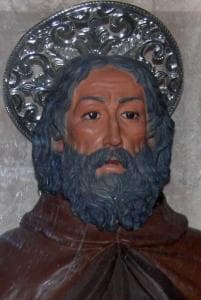
Blessed Conrad Of Bavaria
Blessed
Feast Day: March 17
Biography
Blessed Conrad of Bavaria, also known as Conrad di Baviera, Conrad of Chiaravalle, Conrad of Clairvaux, Conrad of Molfetta, Conrad of Bayern, Conrad the Confessor, Conrad the Guelph, Corrado, or Konrad, was born in 1105 in Veitsburg, Baden-Württemberg, in modern-day Germany. He was the son of Duke Henry IX of Bavaria, belonging to the noble House of Welf.
Conrad received his education at Wiengarten Abbey in Ravensburg, Germany, and later in Cologne, Germany. In his quest for spiritual growth, he joined the Cistercian Order around 1124, embracing the monastic life. Conrad's deep devotion and piety led him to become a student of the renowned Saint Bernard of Clairvaux in Cologne in 1147. Under the guidance of Saint Bernard, Conrad delved into the depths of his faith, developing a profound spirituality.
Motivated by his desire for further spiritual enrichment, Conrad embarked on a pilgrimage to the Holy Lands as part of a spiritual Crusade. However, tragedy struck during his journey, as Conrad passed away on the road in 1154. Conrad's passing was attributed to natural causes.
Following his death, Conrad was interred in a cave near the Santa Maria ad Cryptam Benedictine monastery near Modugno, Italy. Throughout the years, this cave became a traditional resting place for the monastery's deceased members. In 1785, his relics were eventually translated to the cathedral of Molfetta, Italy, where they were enshrined. Recently, in August 2007, the reliquary containing his relics was restored and re-enshrined.
Blessed Conrad of Bavaria has been venerated as a saint, although not formally recognized as such. His feast day is celebrated on various dates, including March 17th, February 9th (on the translation of his relics), February 15th on some calendars, and July 10th on some calendars. Additionally, some calendars commemorate his feast day on the second Sunday of July.
In recognition of his holy life and the impact of his spiritual teachings, Pope Gregory XVI beatified Conrad of Bavaria in 1832, confirming his cultus. As a blessed of the Catholic Church, Conrad serves as an inspiring figure and model of faith for believers.
Blessed Conrad of Bavaria is often depicted in art as a Cistercian monk holding the cathedral of Molfetta, Italy. Another representation shows him as a humble man clad in sackcloth, holding a crown and scepter, symbolizing his devotion to spiritual humility and detachment from worldly desires.